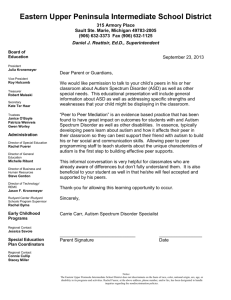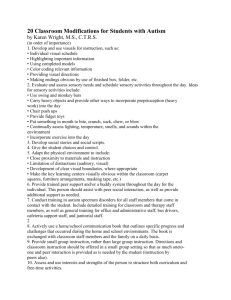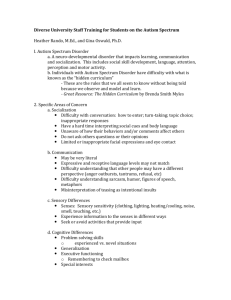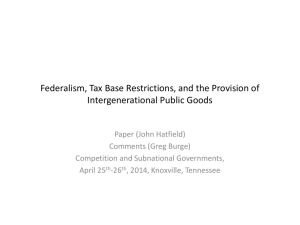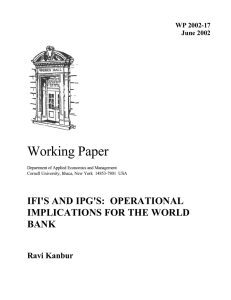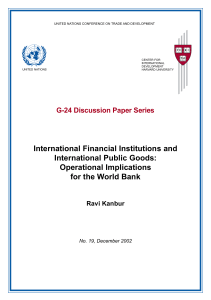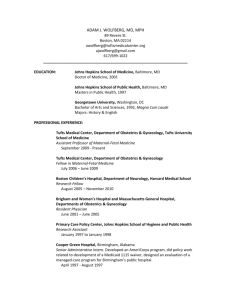Learn more about the seminar - California University of Pennsylvania
advertisement
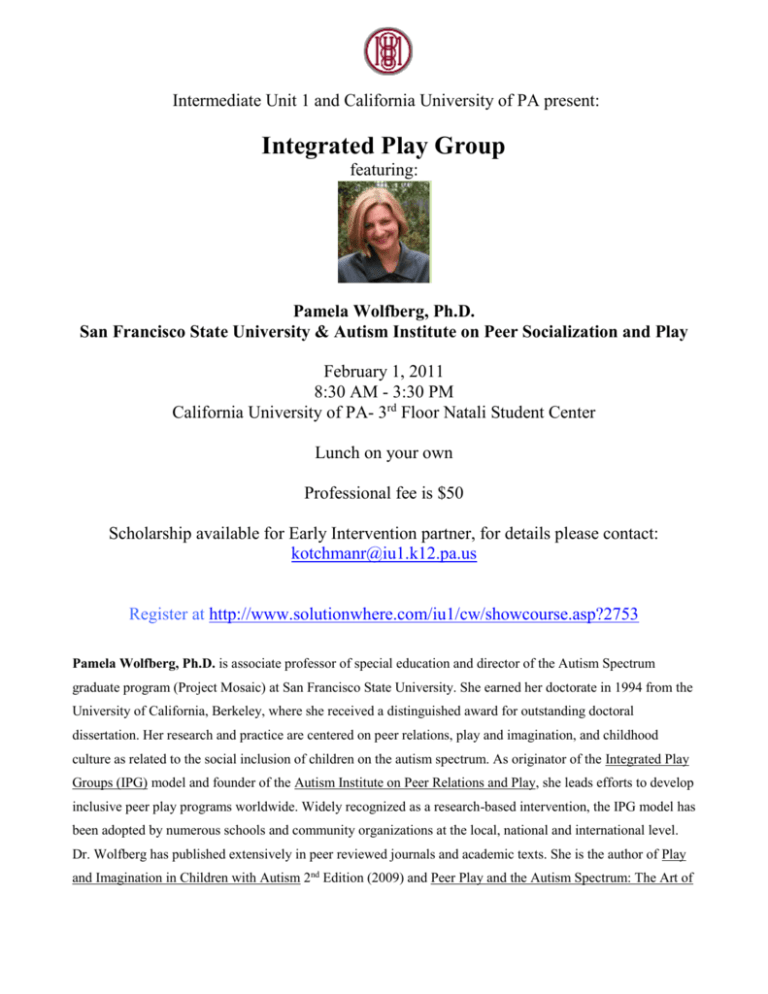
Intermediate Unit 1 and California University of PA present: Integrated Play Group featuring: Pamela Wolfberg, Ph.D. San Francisco State University & Autism Institute on Peer Socialization and Play February 1, 2011 8:30 AM - 3:30 PM California University of PA- 3rd Floor Natali Student Center Lunch on your own Professional fee is $50 Scholarship available for Early Intervention partner, for details please contact: kotchmanr@iu1.k12.pa.us Register at http://www.solutionwhere.com/iu1/cw/showcourse.asp?2753 Pamela Wolfberg, Ph.D. is associate professor of special education and director of the Autism Spectrum graduate program (Project Mosaic) at San Francisco State University. She earned her doctorate in 1994 from the University of California, Berkeley, where she received a distinguished award for outstanding doctoral dissertation. Her research and practice are centered on peer relations, play and imagination, and childhood culture as related to the social inclusion of children on the autism spectrum. As originator of the Integrated Play Groups (IPG) model and founder of the Autism Institute on Peer Relations and Play, she leads efforts to develop inclusive peer play programs worldwide. Widely recognized as a research-based intervention, the IPG model has been adopted by numerous schools and community organizations at the local, national and international level. Dr. Wolfberg has published extensively in peer reviewed journals and academic texts. She is the author of Play and Imagination in Children with Autism 2nd Edition (2009) and Peer Play and the Autism Spectrum: The Art of Guiding Children’s Socialization and Imagination (2003), and co-editor of Educating Learners on the Autism Spectrum: Preparing Highly Qualified Educators (2008). She serves as principal investigator on major research and training grants and as associate editor for Autism: International Journal of Research and Practice. She has an active agenda as an invited international speaker and is the recipient of several eminent awards for her scholarship, research, and service to the community. For more information, visit: www.wolfberg.com or www.AutismInstitute.com. Description of Seminar: This introductory seminar addresses the unique and complex challenges children on the autism spectrum encounter in peer relations and play. Participants will become familiar with the principles and practices comprising Integrated Play Groups, a model designed to support children with autism (novice players) in mutually enjoyed play experiences with typical peers/siblings (expert players) within home, school, community and therapy settings. Based on award-winning research, the IPG model has been found to be effective in enhancing reciprocal social interaction, communication, play and imagination in children of diverse ages and abilities with autism, Asperger’s and related social-communicative needs. Target Audience: Professionals (educators, therapists, related practitioners), parents/family members Learning Outcomes: Participants will become familiar with: • Theories on the nature of autism spectrum disorders, peer relations and play • Principles of the Integrated Play Groups model • Methods to assess social and symbolic play variations in children on the autism spectrum • Methods to guide children’s peer socialization, communication, play and imagination • Methods for designing supportive play environments • Methods for designing quality peer play programs Agenda: I. Introduction – IPG Conceptual Foundation • Nature of play and the autism spectrum • Play’s prominent role in childhood • Key features of the IPG model II. Setting the Stage for Play – IPG Program and Environmental Design • Gathering and preparing the players • Preparing the play setting • Structuring the play session III. Observing Children at Play – IPG Assessment Methods • Fundamentals of the IPG assessment approach • IPG Observation Framework • IPG Assessment Tools IV. Guided Participation in Play – IPG Intervention Methods • Monitoring play initiations • Scaffolding play • Social-communication guidance • Play guidance Future support and team collaboration
